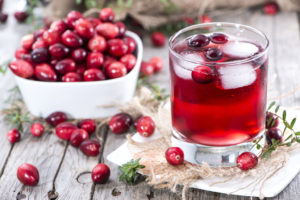
Have a urinary tract infection?
Cranberry juice should be your go-to drink, right? Wrong.
For decades, people have used cranberry juice and cranberry capsules to help prevent and treat urinary tract infections, many times at the urging of their doctors.
But it turns out there’s not much proof it works.
“People have been looking at cranberry juice’s effect on urinary tract treatment or prevention for more than 20 years,” said Christopher Brede, MD, a urologist with Spectrum Health Medical Group. “The data has always been mixed.”
Some studies show some efficacy, while others show none, he said. For that reason, Dr. Brede and a growing number of medical providers have moved away from this practice.
One of the latest studies proving wrong the effectiveness of cranberry juice in preventing urinary tract infections was released in the Journal of the American Medical Association. The study looked at whether high-potency cranberry capsules reduced the number of urinary tract infections in older women living in nursing homes.
Of the 185 female nursing home residents taking part in the trial, there was no difference in the number of urinary tract infections between those taking the capsules and those taking a placebo over one year.
The lead author of the study, Dr. Manisha Juthani-Mehta, told CNN that while her study was of women in nursing homes, other studies in other populations have also not shown a benefit. If women like eating cranberries or drinking cranberry juice, she encouraged them to continue. But she said spending money on cranberry capsules didn’t seem worthwhile, according to the CNN report.
So how did cranberry juice and urinary tract infections become linked in the first place?
According to Dr. Brede, the medical theory was that there’s a substance in cranberries that works to fight bacteria. Therefore, the cranberry juice could form a biofilm over the bladder surface that would prevent the bacteria from binding to it, he said.
If cranberry juice isn’t the answer to prevent and treat urinary tract infections, then what is?
Urinary tract infections are caused by bacteria entering the urinary tract through the urethra. While the body can normally fight off and keep the bacteria from entering the urinary system, sometimes it cannot, causing an infection.
Women are more likely to get a urinary tract infection because their urethra is shorter than a man’s, creating less distance for the bacteria to travel to the bladder.
Dr. Brede said urinary tract infections are more common in elderly people because of problems that hinder complete emptying of the bladder, another cause of urinary tract infections. Also, women after menopause are more susceptible to urinary tract infections because of changes in estrogen patterns.
He said it would be hard for him to recommend cranberry supplements to the nursing home population because it is not an “evidence-based and cost-efficient” treatment.
He’s also skeptical of drinking large amounts cranberry juice, which poses other health risks because of the amount of sugar.
Water frequently
Here’s what Dr. Brede does recommend to prevent urinary tract infection:
- Drink lots of water to keep the bladder flushed out. Ideally, healthy people (those without other medical problems) should drink 2 to 3 liters (this comes to eight to a dozen 8-ounce glasses) of water a day.
- Empty your bladder frequently.
- Post-menopausal women may talk to their doctors to explore if they are a candidate for an estrogen-based topical cream that is applied directly to the urethra to strengthen the tissue.
If you notice symptoms of a urinary tract infection for longer than 24 hours—frequent urination, burning or pain with urination, blood in urine—contact your doctor. Your doctor will perform a lab urine test and will recommend treatment with antibiotics if you test positive for a urinary tract infection.
In children and the elderly population, it can be more difficult to catch these symptoms, making it more difficult to diagnose a urinary tract infection. Look for fever, increased fatigue, abdominal pain and even generalized confusion in the elderly.
Jill Graybill, registered dietitian and community nutrition educator with Spectrum Health Healthier Communities, agreed with Dr. Brede that drinking large amounts of cranberry juice is not recommended. Juice adds calories and sugar, without filling you up.
“It takes three to four oranges to make one 8-ounce glass of orange juice, which you can drink and not feel full,” Graybill said. “Just eating one to two oranges, or fruit of any kind, would help you feel full and also give you fiber, plus more vitamins and minerals than juice.”
She, too, said water should be your go-to beverage, not only for urinary tract health, but for a variety of other benefits. If the color of your urine is light yellow to clear, you are drinking enough water.
Graybill also urged people to strive for a healthy gut microbiome. Formerly known as gut flora, this refers to the microbe population living in our intestines. Proper gut health can only help urinary tract health, as well as many other aspects of health.
She recommends two steps.
The first is prebiotics—feeding and boosting your existing bacteria by consuming healthy, high fiber foods such as fruits, vegetables and whole grains.
The second is probiotics—adding to the bacteria you already have by eating yogurt, kefir or other fermented foods like kombucha tea. Probiotic supplements may be helpful as well.
“It can’t hurt anything to have a healthy gut,” she said.
 /a>
/a>
 /a>
/a>
 /a>
/a>
Very informative